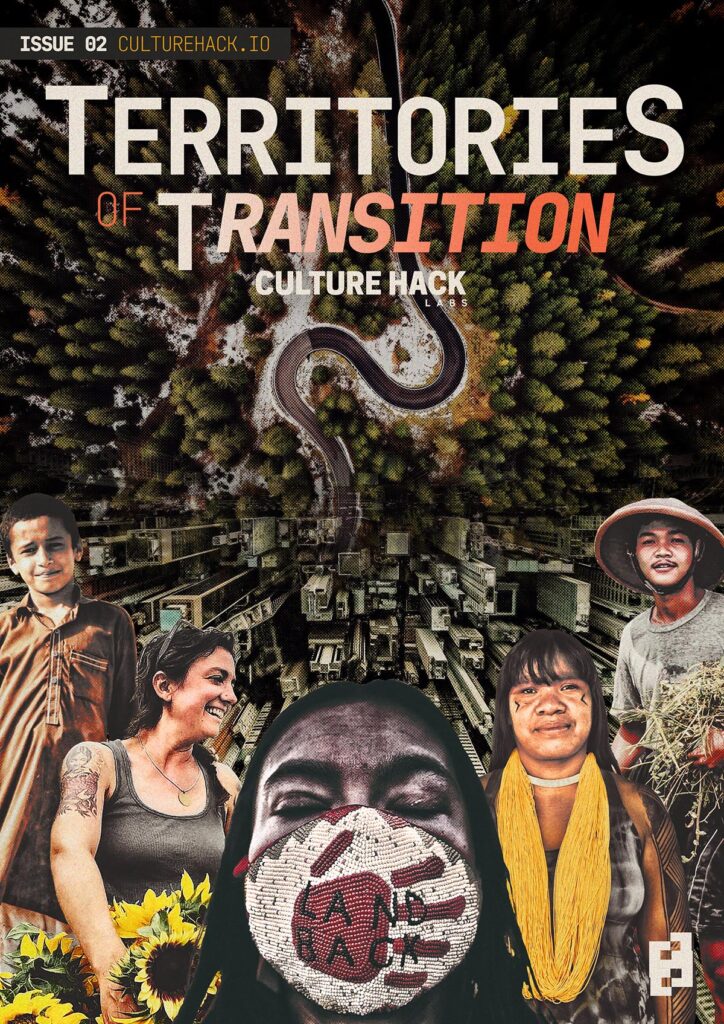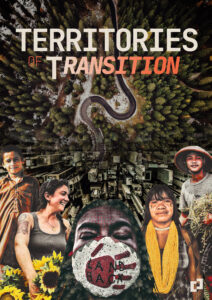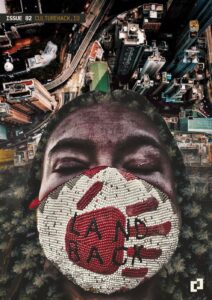Introduction
Territories of Transition – A Narrative Research Report
Culture Hack Labs has partnered with the Schumacher Center for a New Economics to draw attention to the pluriverse of alternative ways of knowing, being and living with the land. We aim to shift public narratives on land to create the conditions for models of collective, post-extractive, post-anthropocentric land stewardship to flourish—so that we may improve our quality of life, rekindle connection to the Earth, and deepen our relationships with one another.
Our goal in this report is to assess the narrative space around land and the commons, and to propose key frames that can be used in unity and solidarity by communities around the world working toward social and ecological justice.

In the age of the Anthropocene, the idea of land ownership sits at the heart of an extraction-based global operating system. US and European land laws have been created by the logic of separation from and extraction of the natural world, class hierarchies, elite ownership, structural racism, and the enclosure and privatization of the commons. For example, in the US the wealthiest 1% of households own 40% of the country’s real estate. This report aims to re-enchant public imagination around the ideals of the commons as a response to our social and ecological crises, moving from what John Kenneth Galbraith terms “private affluence and public squalor” toward George Monbiot’s notion of “private sufficiency and public luxury”.
In this project, Culture Hack Labs has partnered with the Schumacher Center for a New Economics to draw attention to the pluriverse of alternative ways of knowing, being and living with the land. We take particular interest in exploring Indigenous narratives that speak to the spirit of the commons and challenge us to move toward radical relationality with one another and with our planet, as these are already opening up new cultural possibilities. We aim to shift public narratives on land to create the conditions for models of collective, post-extractive, post-anthropocentric land stewardship to flourish—so that we may improve our quality of life, rekindle connection to the Earth, and deepen our relationships with one another.
Our goal in this report is to assess the narrative space around land and the commons, and to propose key frames that can be used in unity and solidarity by communities around the world working toward social and ecological justice.
Point of View
In the ‘Ask’ phase of our research methodology, we inquire into the context that is driving our current narrative research project. To situate us, we have articulated the context, the importance of Indigenous voices and finally our Point of View (PoV).
The Context: Land, commons and socio-ecological crisis
Global crises of recent years have highlighted the interconnectedness of our collective challenges and exposed the flaws in our social systems. From the COVID-19 pandemic’s connections to biodiversity loss and cross-species virus transmission, to the war in Ukraine’s linkages to the world’s dependence on Russian oil, to the increase in record-breaking climate change events, we are constantly reminded of the need to transform our relationship with the land on which we depend.
These living alternatives exist through the commons, yet they are often invisibilized within our dominant cultural narratives and structures of power. From Indigenous land defenders to community-led, solidarity-based responses during the pandemic, examples of commoning—even if not self-identified as such—are manifold.
According to the IPCC, we now only have eight years remaining to turn the tide on climate before we lose any hope of achieving 1.5 degrees. Yet, mainstream solutions to climate and environment are inadequate at best. While high-level initiatives through international agreements, multinational organizations, national government regulation, multi stakeholder coalitions, and industry partnerships helped shape a context for urgency and action, they alone are not going to solve the problem. We need bolder, radical solutions that are fundamentally relational—led by the people most impacted and grounded in the place-based, on-the-ground lived experiences of communities and their relationships to their lands.
Our Point of View
The goal of this initiative is to hack the narrative around land ownership in the US and Europe to create a cultural context in which it is possible to transition as much land as possible out of private ownership into community land trusts or other forms of commons-based ownership models before the onset of deeper ecological breakdown and financial collapse.
Our Theory of Change
At Culture Hack Labs, we believe that all power rests on the ability to harness and control language; and humans make sense of their world through stories. They reveal how our struggles – from land to labour, biodiversity and even our very bodies – are part of the same global system, one that prioritises the production of capital – in other words, economic growth – over Life. everything else, and at the expense of everything else.
Given the escalating climate emergency coupled with the foreboding warnings of the IPCC report, we must acknowledge that existing narratives about our relationship to Other and our Selves have led us astray. Conversely, many Indigenous cultures are life centric, making them relevant alternatives to the fragile, calcified and destructive narratives of late stage Capitalism and Progress. Indigenous peoples are also defenders of 80% of the world’s biodiversity and have shown that their territories are interwoven with their cultures. By drawing inspiration from Indigenous wisdom and practices such as animism—or applying deeply anthropocentric and spiritual qualities to land and non-human life—we aim to reframe the narrative of land and the commons in service of our collective future.
We are therefore able to articulate a three-prong theory-of-change or three ways through which we believe we can create a broader understanding of the necessity of the commons.
We must transition the global operating system to be rooted within a post-extractive, post-anthropocentric worldview. We are amidst a great transition. The humanist and capitalist values typified by the Enlightenment have manifested through colonialism, “accumulation by dispossession” and neoliberal hegemony. The result is that we have brought humanity and the vast majority of the living world to the brink of extinction. Therefore, we must transform our collective values, our understanding of ownership of the world and humanity’s place within it.
Land ownership is at the foundation. Indigenous stewardship of land preserves biodiversity around the world while instituting cooperative models of ownership. These models, in stark contrast to neoliberal models of hyper-individualized ownership, create the outcomes that lead to greater equilibrium between human and more-than-human life, leading to greater levels of ecosystemic flourishing.
Culture is at the root of shifting belief systems. Developing new social and cultural beliefs towards ownership and the collective stewardship of land will be a critical lever in this transition. This is because land ownership, and indeed many of the causative factors of the transition, are not solely economic nor political but fundamentally cultural.
Narrative Reframe Zone
Due to the diversity of communities that we found, it became clear to us that we couldn’t settle on just a singular frame but rather a ‘zone of reframing’. This reframe zone, described below, identifies three ‘reframe pathways’ based on the narrative communities we found, operating in the domains of decolonization, interdependence and radical relationality respectively.
The overarching zone, territories of transitions, describes the collective spaces of lived praxis that have the potential to act as pathways to a post-anthropocentric reality. These territories are not only demarcations of land but living systems that are coordinated by a cultural disposition of interdependence, cooperation and reciprocity with all life.
| Reframe Zone | From commons to territories of transition for cultural evolution. | ||
| Domain | Decolonization | Interdependence | Radical Relationality |
| Core Metaphor | Reclaiming what was taken | We are all connected | The dance of life |
| Focus | Breakdown Urgency | System Design Planning | Lived-Praxis Emergence Embodiment |
| Logic | The most direct route to justice (social, economic and climate) is to return land back | Survival depends on high levels of cooperation. | Territories are living beings that we are a part of – we exist through reciprocal relationship and kinship. |
| Values | Reparations Reclamation Reconciliation | Reconciliation Relationality Reciprocity Resilience Regeneration | Regeneration Kinship Animism Thriving life Interbeing |
| Potential evolutionary frames | Land back to right relations. | Our liberation is entangled, our healing connected. | The territory is our body. Our bodies are the territory. We are the Earth healing itself. Territory is kin. |
| Communities of interest | Land back Ecocidio Land defenders | Rights of Nature Community Land Trusts Food sovereignty Regenerative ag Agroforestry CSAs | Communalidad Bioregionalism Indigenous communities |
You can find more detail and the full narrative landscape analysis by downloading the PDF below. If you have any questions, comments or would like to contribute, collaborate or support our work please contact us at: [email protected]

